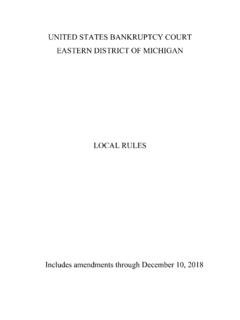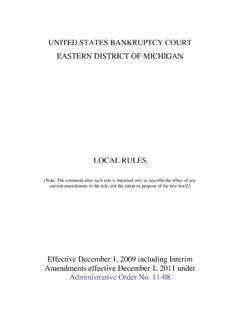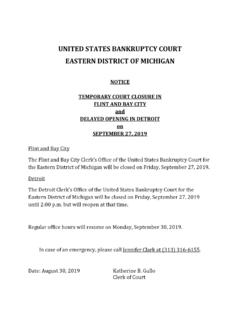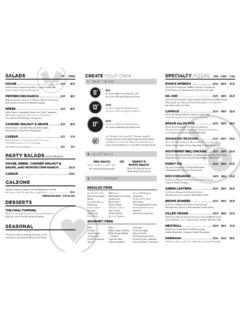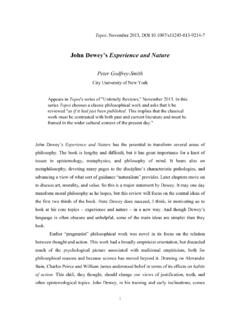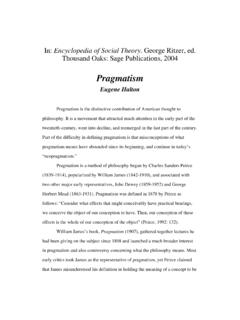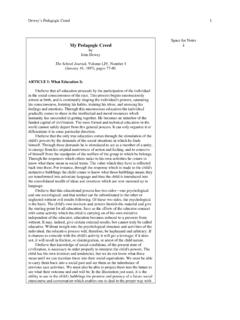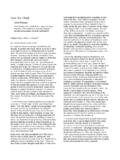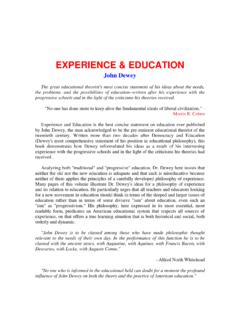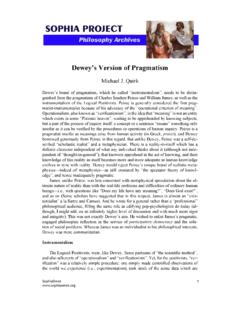Transcription of UNITED STATES BANKRUPTCY COURT EASTERN DISTRICT OF ...
1 UNITED STATES BANKRUPTCY COURTEASTERN DISTRICT OF MICHIGANSOUTHERN DIVISIONIn re:Case No. 17-40160 THOMAS dewey FRENCH,Chapter 7 Debtor. /Judge Thomas J. TuckerDANIEL M. McDERMOTT, UNITED STATES TRUSTEE,Plaintiff, Pro. No. 17-4307 THOMAS dewey FRENCH,Defendant. /TRIAL OPINIONI. IntroductionThe Defendant in this adversary proceeding, Thomas dewey French, filed a Chapter 7bankruptcy case on January 6, 2017. In this adversary proceeding, the Plaintiff Daniel , UNITED STATES Trustee, seeks a judgment denying Defendant French s discharge,based on the false oath provision in 11 727(a)(4)(A) (Count II of Plaintiff sComplaint).
2 The COURT held a bench trial, which was followed by Plaintiff s filing of a complete1list of the false oaths the Plaintiff contends Defendant French made. This adversary proceedingis now ready for COURT has considered all of the evidence and arguments presented by the parties. This includes the testimony of the witnesses namely, Defendant Thomas French ( French ),17-04307-tjt Doc 44 Filed 11/15/18 Entered 11/15/18 16:41:59 Page 1 of 18and Colleen Capalbo. And this includes all of the exhibits that were admitted into evidence 2namely, Joint Exhibits 1-20.
3 This Opinion STATES the COURT s findings of fact and conclusions the reasons stated below, the COURT finds for Defendant French, and will enter a judgment dismissing Plaintiff s complaint objecting to French s discharge, with JurisdictionThis COURT has subject matter jurisdiction over this adversary proceeding under 28 1334(b), 157(a) and 157(b)(1), and Local Rule (a) ( Mich.). This is a coreproceeding under 28 157(b)(2)(J).III. DiscussionA. Applicable law: BANKRUPTCY Code 727(a)(4)(A)Plaintiff alleges that French made many false statements under oath, with fraudulentintent, so that the COURT should deny French a discharge under BANKRUPTCY Code 727(a)(4)(A).
4 To describe the law applicable to Plaintiff s claim, the COURT adopts andreiterates what it said in a recent opinion in the cases of McDermott v. Wise and Wise v. Wise (Inre Wise), 590 401 (Bankr. Mich. 2018). In that opinion, the COURT stated:Section 727(a) of the BANKRUPTCY Code contains twelveenumerated grounds for denying the debtor a discharge. See 727(a)(1)-727(a)(12). For the COURT to deny the debtor adischarge under any one of these grounds, the party objecting to thedischarge must prove all of the elements of such ground by apreponderance of the evidence.
5 Keeney v. Smith (In re Keeney),227 679, 683 (6th Cir. 2000). Exceptions to discharge arenarrowly construed in furtherance of the BANKRUPTCY Code s freshstart policy. However, the very purpose of certain sections of thelaw, like [ 727(a)], is to make certain that those who seek theshelter of the [B]ankruptcy [C]ode do not play fast and loose with217-04307-tjt Doc 44 Filed 11/15/18 Entered 11/15/18 16:41:59 Page 2 of 18their assets or with the reality of their affairs. Robin Singh , Inc. v. McCarthy (In re McCarthy), 488 814, 825( 1st Cir.)
6 2013) (citing Palmacci v. Umpierrez (In reUmpierrez), 121 781, 786 (1st ) (internal quotationmarks and citations omitted))..Section 727(a)(4)(A) of the BANKRUPTCY Code STATES :(a) The COURT shall grant the debtor a discharge,unless ..(4) the debtor knowingly and fraudulently, in or inconnection with the case--(A) made a false oath or account[.]11 727(a)(4)(A). The UNITED STATES COURT of Appeals forthe Sixth Circuit has specified the elements that the Plaintiff mustprove, by a preponderance of the evidence under 727(a)(4)(A). In Keeney, the COURT stated:In order to deny a debtor discharge under thissection, a plaintiff must prove by a preponderanceof the evidence that: 1) the debtor made a statementunder oath; 2) the statement was false; 3) the debtorknew the statement was false; 4) the debtor madethe statement with fraudulent intent; and 5) thestatement related materially to the BANKRUPTCY at 685 (citations omitted).
7 With respect to the first element noted above, that thestatement was made under oath, statements made under penalty ofperjury, such as [the Debtor s] statements in her bankruptcyschedules and SOFA, are considered to be under oath for purposesof 727(a)(4)(A). See Lim v. Storozhenko (In re Storozhenko),487 457, 466 (Bankr. Mich. 2012) (citing Keeney, at 686 and 28 1746).As for the fifth of these elements, materiality:317-04307-tjt Doc 44 Filed 11/15/18 Entered 11/15/18 16:41:59 Page 3 of 18 The subject of a false oath is material if it bears arelationship to the bankrupt s business transactionsor estate, or concerns the discovery of assets,business dealings, or the existence and dispositionof his property.
8 Keeney, 227 at 686 (citations omitted).As for the fourth of the Keeney elements, , the fraudulentintent element: Complete financial disclosure is a prerequisiteto the privilege of discharge.. [I]ntent to defraud involves a material representation that you know tobe false, or, what amounts to the same thing, anomission that you know will create an erroneousimpression. A reckless disregard as to whether arepresentation is true will also satisfy the intentrequirement. [C]ourts may deduce fraudulentintent from all the facts and circumstances of acase. However, a debtor is entitled to discharge iffalse information is the result of mistake at 685-86 (citations omitted).
9 This COURT reiterates what it said about the fraudulent intentelement, in the case of Becker v. McInerney (In re McInerney), 109, 114-16 (Bankr. Mich. 2014):[N]ot caring whether some representation is true orfalse the state of mind known as recklessdisregard is, at least for purposes of theprovisions of the BANKRUPTCY Code governingdischarge, the equivalent of knowing that therepresentation is false and re Chavin, 150 726, 728 (7th Cir. 1998)(citations omitted)..In a recent bench opinion in McDermott v. Schwenck (In reSchwenck), this COURT interpreted Keeney as requiring the COURT toemploy a totality of circumstances test to determine whether the417-04307-tjt Doc 44 Filed 11/15/18 Entered 11/15/18 16:41:59 Page 4 of 18 fraudulent intent element of 727(a)(4)(A) has been satisfied.
10 (See Docket # 30 in Adv. Pro. No. 13-4701 (Tr. of Opinion onTrustee s Mot. for Summ. J.) at 14-17.) Under that test, a findingthat a debtor had a reckless disregard as to whether arepresentation is true, does not, standing alone, require the courtto find that the fraudulent intent requirement of 727(a)(4)(A)has been established. Rather, whether a debtor had a recklessdisregard as to whether a representation is true, is one factoramong others that a COURT may consider in determining whether todraw an inference of fraudulent intent on the part of a debtor.
